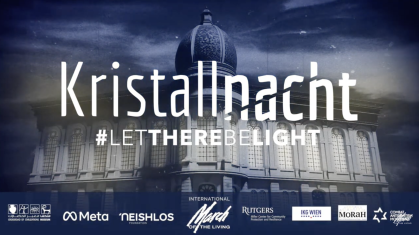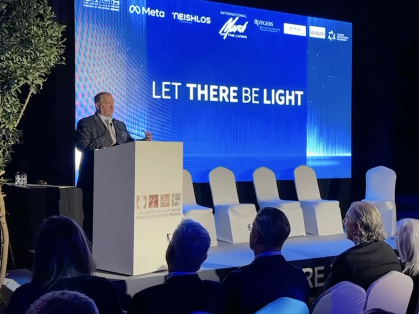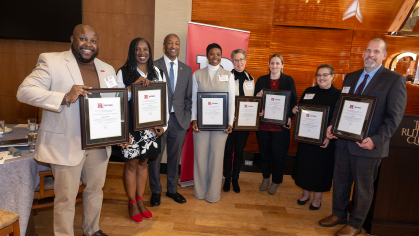Rutgers Miller Center Joined International March of the Living for Kristallnacht Commemoration in Dubai
The event marked the 84th anniversary of a series of violent, antisemitic raids in which hundreds of synagogues were damaged or destroyed by Nazis

The Miller Center for Policing Excellence and Community Resilience at Rutgers University-New Brunswick partnered with the International March of the Living for the 2022 “Let There Be Light” Kristallnacht Commemoration at the Crossroads of Civilizations Museum in Dubai, United Arab Emirates.
The purpose of the commemoration was to remember the past and raise awareness about the current atmosphere of intolerance, prejudice and racism that exists in the world today.
A broadcast of the Nov. 9 event airs 7:30 p.m. EST Thursday, Nov. 17, on the Jewish Broadcasting Service.
The event marked the 84th anniversary of Kristallnacht, which refers to a series of violent, antisemitic raids in which hundreds of synagogues were damaged or destroyed by Nazis. About 100 Jews were murdered and 30,000 more were rounded up and sent to concentration camps, marking a key juncture in the mass genocide of the Jewish people carried out by Nazi Germany during World War II.
The keynote speech was delivered by Eve Kugler, the first Holocaust survivor to tell her story in Dubai. Kugler was 7 years old when the Germans broke into her home on Kristallnacht.
“This year's commemoration looks both to the past, in recognizing the suffering and persecution of Jews on that terrifying night in 1938, and to the present, in which vulnerable populations around the world confront isolation, hatred, and violence,” said John J. Farmer Jr., director of the Miller Center and the Eagleton Institute of Politics at Rutgers University–New Brunswick. “Its message is simple: Never again.”

“I responded to over 250 hate crimes in the United States and across Europe,” said Paul Goldenberg, senior fellow for Transnational Security at the Miller Center, former member of the U.S. Department of Homeland Security Advisory Council and former chair of the DHS subcommittee that addresses targeted violence against religious communities “What I’ve seen during the past 36 months rattles someone like myself.”
Goldenberg added: “How did we get to this place? Where do we go from here? Our strength lies in diversity, acceptance and a common collective goal to assemble freely in our respective houses of worship without fear, intimidation or threat of violence. During times of crisis and other catastrophic events, it’s the community organizations – the very fabric of democracy – that are best positioned to become critical partners. They simply need the resources and training. That’s our work at the Miller Center.”
Goldenberg, who spoke about hate crimes and his experience working in law enforcement and national security at the commemoration, said 2023 will bring more complex challenges for vulnerable communities. At the request of governments, nongovernmental organizations and communities of faith, Miller Center experts will be traveling throughout the U.S. and Europe in the months ahead to further the center’s core mission.
“We are indeed very proud and honored to consider the Miller Center for Policing Excellence and Community Resilience at Rutgers University our long-standing partner in combating intolerance, racism, antisemitism and all forms of hatred globally,” said David Machlis, a professor at Adelphi University and co-founder of the International March of the Living, a Holocaust remembrance and education organization. “The center’s seminal research on hate crimes on the internet and their tireless efforts to protect faith-based communities from attacks that seem to be growing exponentially is both admirable and perfectly aligned with the universal goals of the March of the Living.”


